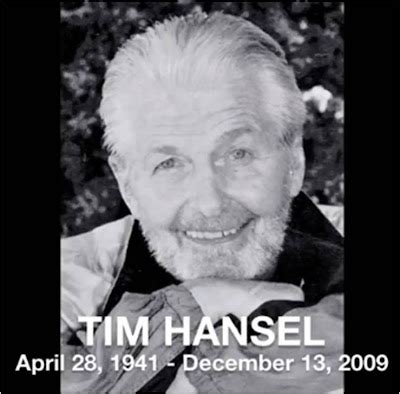A Quote by Harold Klemp
Very often, we are confronted by people who want us to pray their way or colleagues who want us to think their way. We must remember to maintain our individual relationship with God. We have the shining light of Soul, and because we have it, we also have the wisdom of God.
Related Quotes
Why pray? Evidently, God likes to be asked. God certainly does not need our wisdom or our knowledge, nor even the information contained in our prayers ("your Father knows what you need before you ask him"). But by inviting us into the partnership of creation, God also invites us into relationship. God is love, said the apostle John. God does not merely have love or feel love. God is love and cannot not love. As such, God yearns for relationship with the creatures made in his image.
You must realize that it is the ordinary way of God's dealings with us that our ideas do not work out speedily and efficiently as we would like them to. The reason for this is not only the loving wisdom of God, but also the fact that our acts have to fit into a great complex pattern that we cannot possibly understand. I have learned over the years that Providence is always a whole lot wiser than any of us, and that there are always not only good reasons, but the very best reasons for the delays and blocks that often seem to us so frustrating and absurd.
There are two gods. The god our teachers teach us about, and the God who teaches us. The god about whom people usually talk, and the God who talks to us. The god we learn to fear, and the God who speaks to us of mercy. The god who is somewhere up on high, and the God who is here in our daily lives. The god who demands punishment, and the God who forgives us our trespasses. The god who threatens us with the torments of Hell, and the God who shows us the true path.
There are two gods. A god who casts us off because of our sins, and a God who calls to us with His love.
If we want to read and to pray the prayers of the Bible and especially the Psalms, therefore, we must not ask first what they have to do with us, but what they have to do with Jesus Christ...It does not depend, therefore, on whether the Psalms express adequately that which we feel at a given moment in our heart. If we are to pray aright, perhaps it is quite necessary that we pray contrary to our own heart. Not what we want to pray is important, but what God wants us to pray.
Our mistake is that we want God to send revival on our terms. We want to get the power of God into our hands, to call it to us that it may work for us in promoting and furthering our kind of Christianity. We want still to be in charge, guiding the chariot through the religious sky in the direction we want it to go, shouting "Glory to God," but modestly accepting a share of the glory for ourselves in a nice inoffensive sort of way. We are calling on God to send fire on our altars, completely ignoring the fact that they are OUR altars and not God's.
I want to see Christianity enhance our humanity instead of rescue us from some fall. I don't want us to be depending on this supernatural God up in the sky; I want us to recognize that God is part of who we are and that we have to live out the meaning of God with other people. That means we must live in mutual respect and interdependence; it means we have to limit our own desires in order for the body politic to survive.
God is the light shining in the midst of darkness, not to deny that there is darkness in the world but to reassure us that we do not have to be afraid of the darkness because darkness will always yield to light. As theologian David Griffin puts in, God is all-powerful, His power enables people to deal with events beyond their control and He gives us the strength to do those things because He is with us.
When God does a miracle somehow you have to respond. When God does things for you - maybe we don't deserve them and we can never really repay God but God really wants us to respond to them. He doesn't want us to stay the same. So, for us to respond to what God has done in our lives is probably the same way he would want anyone to do - "Just tell people what I've done for you and what you've seen and heard." That's what we're doing.
Do we get what we want? Yes, we get what we want. God is that
loving. If we want isolation, despair, and the right to be our own
god, God graciously grants us that option. If we insist on using our
God-given pwer to make the world in our image, God allows us that
freedom; we have the kind of license to do that.that's how love
works. It cant be forced, manipulated, or coerced. It always leaves
room for the other to decide. God says yes, we can have what we want,
because love wins.
It's a risky thing to pray and the danger is that our very prayers get between God and us. The great thing in prayer is not to pray, but to go directly to God. . . . The fact is, though, that if you descend into the depths of your own spirit and arrive somewhere near the center of what you are, you are confronted with the inescapable truth that, at the very root of your existence, you are in constant and immediate contact with the infinite power of God.
When we think of training ourselves in godliness, we usually think of the traditional spiritual disciplines, but it can also be practical activities like taking a nature walk or listening to music - whatever helps us draw closer to God. God hardwired our brains and bodies in such a way that spiritual training, combined with God's work in us, has the very real effect of making us more attuned to spiritual reality and our true identity in Christ.
God has spoken very boldly about his desire to be a presence in our lives. If I want to heal the ache and loneliness in my own life, one of the things I need to do is get away, alone with God. . . . In the silence God will speak to you most powerfully. Too often his words to us get muffled, lost, or covered by the crowd of many noises both inside and outside of us. We must have a quiet heart in order to hear God's distinctive message to us.






























